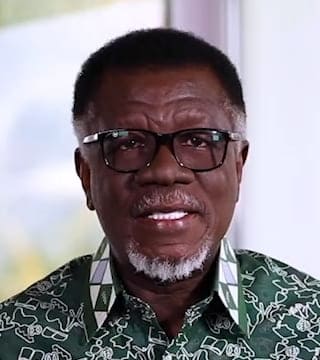Mensa Otabil - When The Call Is Not Clear (09/30/2025)
We’re looking at the calling of Samuel, and sometimes when God calls us, the calling is not clear.
First Samuel, chapter 3, verses 6 to 7: «Then the Lord called yet again, Samuel.» So Samuel arose and went to Eli and said, «Here I am, for you called me.» He answered, «I did not call, my son; lie down again.» Now Samuel did not yet know the Lord, nor was the word of the Lord yet revealed to him. God called to Samuel the second time, and he responded the same way as he had the first time. He said, «Here I am,» and then he went to the wrong person. He went to Eli, and he got the same response from Eli: «I did not call you.» The Bible says that the reason why Samuel could not discern the voice he was hearing was that he did not yet know the Lord, nor was the word of the Lord yet revealed to him. That’s a very poignant statement. Samuel had lived his life in the house of the Lord since his mother brought him to the tabernacle. After weaning him, Eli had trained him to serve in the Levitical order. He served in the house of the Lord, yet he did not know the Lord, neither did he know the word of the Lord.
So, is it possible for somebody to be trained to be religious, to be in the house of the Lord, to participate in all the important sessions and lessons taught in the house of God, and still not know the Lord? That phrase that he did not know the Lord does not mean Samuel did not know who God was; it simply means he didn’t have a personal relationship with God. He had a relationship with Eli, the servant of God, but not with God. It’s very easy for people to have a relationship with a man of God or a woman of God and not have a personal relationship with God. Samuel couldn’t tell when God was speaking to him because he did not know the Lord as yet. Almost everybody that God used in the Bible had a personal encounter with God. God would reveal Himself to them, and they would have a personal encounter with Him. It was on the basis of this personal encounter that they served the Lord.
So, if you want God to do something with your life, you must know Him personally—not through your pastor, not through your church—but know Him personally. It’s great to have a pastor; it’s great to belong to a great church, but you must know Christ; you must know God personally. Samuel’s calling was that of a prophet, and this encounter was the process God used to call him to become a prophet to speak to the nation. Ironically, the man God wants to use to speak to the nation cannot discern the voice of God. Isn’t that the grace of God in action? A person who is not qualified, who is immature, who doesn’t have the experience is the one God wants to use, and he’s bumbling; he’s making mistakes, but still God wants to use him. That simply tells you that your immaturity will not disqualify you from your purpose. God can still use you even while you are making mistakes and bumbling things up, but God will work with you and get you to the point of usability.
Samuel was disadvantaged, but God did not give up on him. God knows how to train each one of us; He knows how to work with us. He knows our limitations; He knows our weaknesses; He knows where we fall short, but He still wants to use us. I pray that God will use you tremendously in spite of yourself, that His grace will lift you up, and where you are weak, He will make you strong.
Let us pray. Say with me, «Heavenly Father, I know I don’t know it all. Please teach me Your ways and help me to be the person You want me to be. In Jesus' name, amen.»
Well, my friends, and Pastor Mensa Otabil, shalom—peace and life to you.

